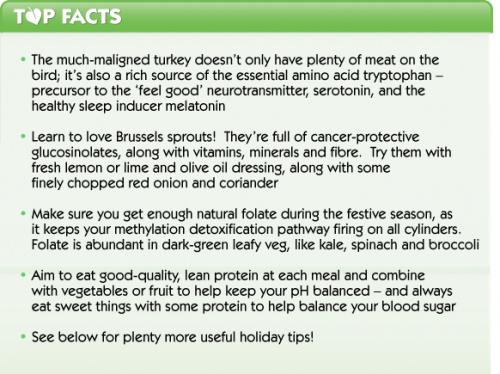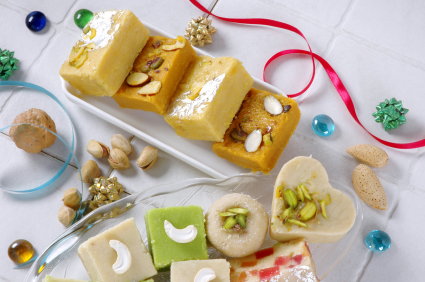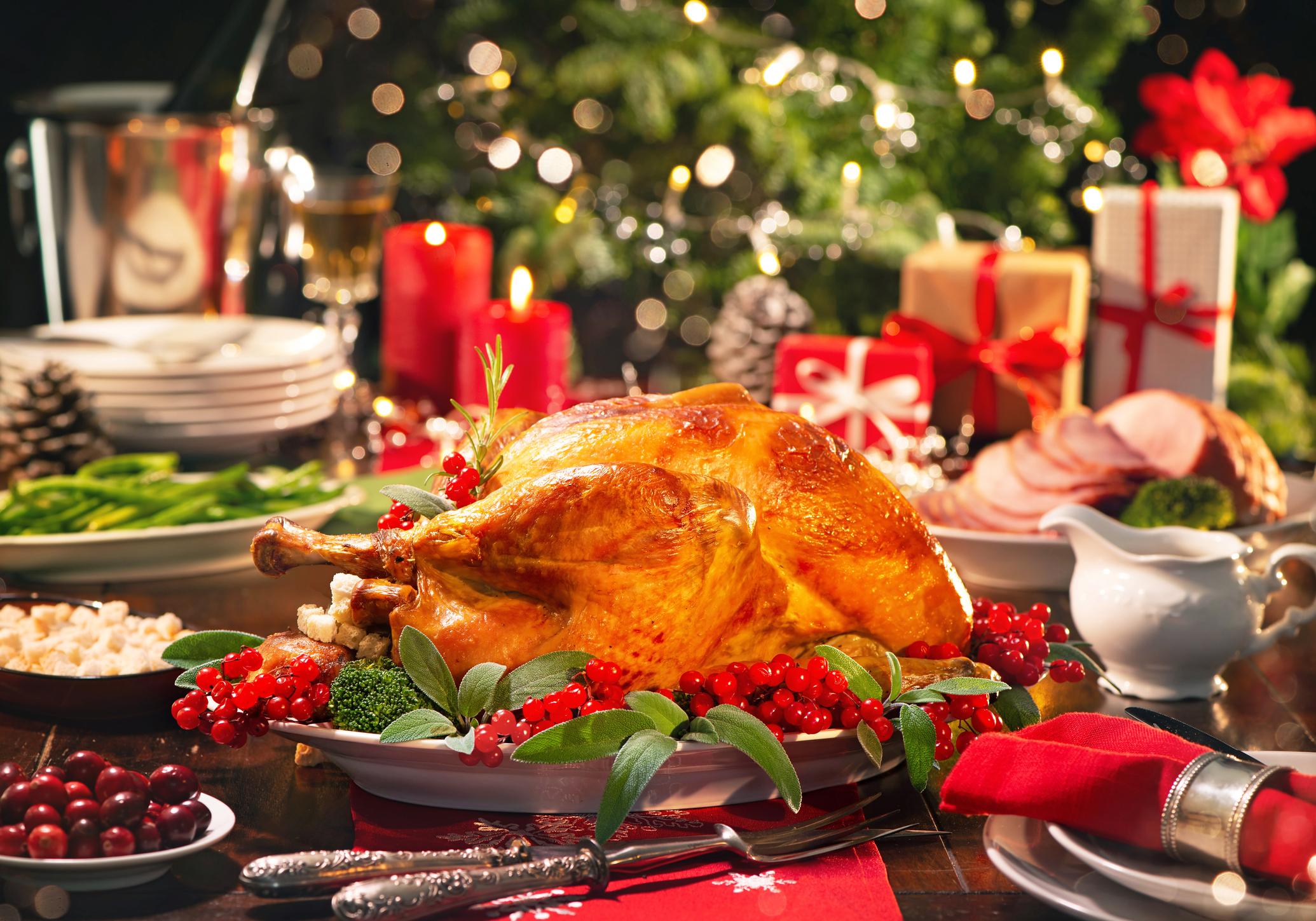Content Sections
For much of the world, the festive break is almost here. Whether we celebrate a traditional Christmas or just enjoy time out over the holidays, one thing is guaranteed for many of us: an onslaught of food, drink and time with the relatives. All of which you may or may not be prepared for!
Turkey, anyone?
Often criticised for being dry and tasteless, and frequently overlooked for more delectable fowl, don’t be too hard on the old turkey. He may be more a part of American traditions, having only been brought to the UK around the 16th century, but he first become the feast of English royalty at Christmas during the 19th century. Before that, goose, swan, peacock, beef and rabbit were more likely to grace tables on Christmas day, depending on how deep the purchaser’s pockets were. In days gone by, the larger the fowl on the table, the more festive your day was considered to be.

Top up the tryptophan
Apart from being exceptionally abundant in terms of the amount of meat on the bird, turkey is also packed full of the amino acid tryptophan. Because we can’t make it in the body, tryptophan is one of the essential amino acids (the building blocks that form protein) that we must obtain from our diet. Essential amino acids are also the precursors for other key substances in the body. Turkey offers us a healthy dose of tryptophan, which is the starting point for two incredibly important neurotransmitters – serotonin, our ‘feel good’ hormone, and melatonin, our deep, healthy sleep inducer.
Stock up on serotonin
If you’re blanching at the thought of all your relatives gathering and maintaining the merriment throughout the big day, then you could all benefit from a dose of serotonin. Not just for your brain: although less acknowledged, serotonin plays a key role in our digestive tract. About 80–90% of our serotonin is found in our gut. If your gut serotonin level drops too low, you’re likely to suffer poor contraction (peristalsis) and poor nerve signalling. What’s more, you’ll feel like you’re starving – never good when there are often so many sugary delights around to tempt you! Get enough tryptophan into you, say around 350 mg, as found in around 110 g of turkey breast, and not only will you promote proper peristalsis and pain signalling, but your body will tell you when you’ve eaten enough – or something that might be toxic.

Active peristalsis also means that you can shift the food from end to end without it becoming uncomfortably stuck at the various staging posts along the way! And once the day is over, what could be better than having enough melatonin to ensure a great night’s sleep to let body and mind recover? Before you do it all over again with the leftovers…
If tradition or turkey aren’t really your thing, or if you’re vegetarian or vegan, you don’t have to miss out on your tryptophan on Christmas day. Eggs, cod, soya beans (non-genetically modified [GM], naturally!), sunflower seeds and cheese all have high levels too.

Pakistani and Indian Traditional sweets
Superfood support to the rescue
Admit it: the word ‘detox’ is usually banned from most people’s vocabulary until January, with many treating detoxification as an annual service – rather like the service they’d give any motorised vehicle they own. The uncomfortable truth is that it’s actually a vital daily activity for your body. And nearly everyone can do with giving it a bit of extra support over the Christmas and New Year break! Thankfully, Mother Nature has provided bountiful resources of just the right vitamins, minerals and phytonutrients to offset over-indulgences. Here’s a reminder of some of the best foods to include in your festive menus:
- Love ‘em or hate ‘em, Brussels sprouts are full of cancer-protective glucosinolates, help to lower cholesterol and are chock-full of vitamins and minerals, as well as being a good source of fibre. Did you know there are nearly 100 studies in PubMed focused on the benefits of the humble Brussels sprout (to which EFSA gives scant regard)? They’re vital for supporting our detoxification processes and are both antioxidant and anti-inflammatory in their effect. Learn to love them and get creative with how you prepare them – they don’t need to be boiled to death! Try them with a fresh lemon or lime and olive oil dressing, along with some finely chopped red onion and coriander
- Dark-green and leafy vegetables, e.g. broccoli, kale, spring greens, green cabbage, spinach and green beans, are great natural sources of B vitamins, including natural folate, which is vital for supporting one of our most important liver detoxification pathways (methylation). Unlike folate, folic acid – the synthetic form that is found in the vast majority of vitamin supplements – does not support methylation. In short, we can’t detoxify all that festive excess without our methylation pathways working properly!
- Cranberries are a rich source of phytonutrients, particularly antioxidant flavonoids. They’re great to support immune health and keep your urinary tract healthy while it deals with all the festive treats, but also help to maintain a healthy heart and protect against stomach ulcers. Watch out for the sugar in ready-made cranberry sauces or jellies: make your own using organic cranberries and then fresh orange or apple juice instead of sugar
- Satsumas are a low-calorie sweet treat full of vitamin C and fibre, so reach for the fruit bowl before the box of chocolates!
- Red wine: the resveratrol in it may help you offset some of the festive damage. Have too much, of course, and you compromise your liver, because alcohol is still alcohol! Resveratrol is a unique antioxidant with a whole host of benefits, including anti-cancer and anti-inflammatory properties, and also helps to protect the delicate fats that make up your cell membranes. Healthy cells mean better function. If you don’t want your resveratrol with alcohol, and you want to benefit from a more beneficial dose, you can of course take it as a supplement. Typically, a glass of red wine might give you between 300 mcg to 4 mg of resveratrol – with Pinot Noir being the grape that often yields the most. A good resveratrol supplement, by contrast, might give you 100 mg per capsule! The choice is yours!
- A tablespoon of humble apple cider vinegar taken in a glass of water with the juice of half a lemon before meals will boost stomach acid production and help to offset heartburn, indigestion and gas, and is just generally ‘tummy-friendly’
- Remember your healthy fat choices too – cooking with coconut oil, drizzling with olive oil and roasting (if you have to have roast potatoes!) for the non-veggies with goose or duck fat.


Be kind to your body tips
Despite all our good intentions, we all know it’s extremely hard to avoid overeating and drinking and feeling like a bloated toad at some point over the holidays! But here are a few tips to remember that may just help prevent you having to loosen your belt or reach for the tracksuit pants after dinner:
- Aim to eat good-quality, lean protein at each meal and combine with vegetables or fruit to help keep your pH balanced
- Always eat your ‘sweet treats’ with a protein-rich food, and make sure you eat a couple of bites of the protein first. This helps to dampen down the insulin response and manage your blood sugar levels
- Cup your two hands together to form a bowl shape. That’s the size of your stomach… It’s true – your eyes are bigger than your tummy, so don’t pile up your plate because it all looks so good!
- Heed your satiation response – when you feel full, it’s time to stop eating. It’ll all still be there at the next meal
- Make sure you don’t graze all day. Far from stimulating your metabolic fire, it keeps you in a constant state of inflammation. Give your digestion a rest by having at least a 4–5-hour break between meals
- Get off the sofa, away from the TV and expend some energy outdoors. There’s nothing better than fresh air and activity to get your system moving, so remember it’s a must-do every day, whatever the weather
- Get your quota of fibre by eating enough vegetables and fruit. Apples are a great source of insoluble fibre and full of gut-soothing healthy enzymes – eat them raw or stewed
- Asparagus, onions, leeks, garlic, beans and bananas are good prebiotic foods to keep your gut bacteria happy and healthy. And a happy gut means a happy mind!
- Make sure you drink enough water to balance out the dehydrating effect of the alcohol. Black tea and coffee don’t count! They are also dehydrating, so aim for at least 2 L of fresh water a day. If you want to snack between meals, drink a glass of water instead: it’s likely you’re thirsty and not hungry!
We wish you all a happy, healthy holiday that’s full of fun, laughter and love.








Comments
your voice counts
There are currently no comments on this post.
Your voice counts
We welcome your comments and are very interested in your point of view, but we ask that you keep them relevant to the article, that they be civil and without commercial links. All comments are moderated prior to being published. We reserve the right to edit or not publish comments that we consider abusive or offensive.
There is extra content here from a third party provider. You will be unable to see this content unless you agree to allow Content Cookies. Cookie Preferences